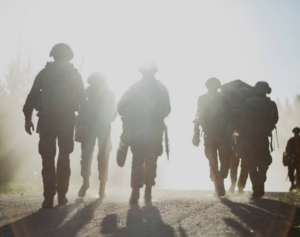
The ongoing war in Ukraine is a stark reminder that armed conflicts in today’s world often unfold among civilian populations. This raises important questions about the role of the military in securing the public in our societies. How military officers’ story and narrate historical events can tell us a great deal about how they structure the present landscape and their perspectives on conventional civil-military divides.
The Menstad Battle and the Separation of Power
In 1931, a labour dispute erupted at Menstad in Norway, involving mass fighting between striking workers and police officers. This prompted the government to deploy the military to the scene. Although the military never took part in the fighting, the government’s choice to parade its monopoly on power was heavily criticized (Johansen, 1977). Somewhat surprisingly, the military officers I interviewed in my PhD-project frequently cited the Menstad battle to argue contrasting views on their profession’s involvement in civilian security. Some officers saw this incident as evidence against the military operating among civilians. They used the historic event as a narrative resource to argue that using the military for civilian security undermines the fundamental democratic principle of the separation of powers, which prevents the military from being used against civilians. A few even reflected that Menstad has shaped their mentality, so much so that they take this mindset to the operations they serve.

Questioning the Strict Divide
Other officers challenged this rationale, sarcastically highlighting the anachronistic nature of maintaining a strict separation between the military and civilian domains. These officers argued that the Menstad battle should not be the basis for restricting the military’s role in addressing public security challenges. They ridiculed the idea that the Norwegian Armed Forces, under government instruction, would turn against their own people. As one officer stated, “We have more of a people’s army than China!” suggesting that the situation in Norway has evolved significantly and calls for reconsidering the strict divide.
Understanding the Present by How the Past is Storied
Certain critical incidents, such as the September 11 attacks (2001) or the Rodney King Incident (1991), become repeated narrative references. Over time, these incidents become touchstones that shape our understanding of security issues, setting precedence for how new situations should be analyzed. In my study, Menstad emerged as one of these recurring incidents. The frequent reference to Menstad suggests that this specific event has been institutionalized, providing a framework for professional sense-making. However, that a story is repeatedly invoked as the sounding board to frame a complex topic does not guarantee its relevance in a contemporary society.
The Power of Echoed Stories
As my research shows, there are diverging perspectives among security practitioners on the civil-military divide represented by the Menstad narrative, casting doubt on the story’s veracity today. Nevertheless, this is the story that has prevailed, and repeated stories have power.
This makes me wonder how the military-civilian relationship would be perceived today had another story been chosen as a point of reference from the many security incidents that occur over time. How might today’s interpretation of the military’s involvement in civilian security differ?
Rather than accepting echoed past events as confirmation of the established conceptual ideas they have come to represent, we might consider them indicative of issues that people find important – issues that, therefore, merit continuous reevaluation.
Sine Vorland Holen is a researcher and senior advisor at the Norwegian Defence University College, and a PhD candidate at the University of Oslo’s Department of Criminology and Sociology of Law. Her project investigates military officers’ perceptions of justness in civilian security crises.
